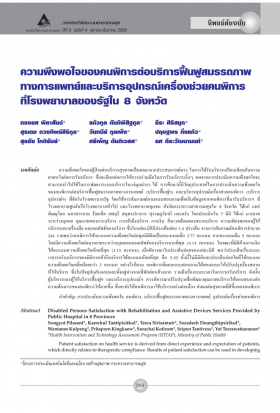ทรงยศ พิลาสันต์
แก้วกุล ตันติพิสิฐกุล
ธีระ ศิริสมุด
สุรเดช ดวงทิพย์สิริกุล
วันทนีย์ กุลเพ็ง
ปฤษฐพร กิ่งแก้ว
สุรชัย โกติรัมย์
ศรีเพ็ญ ตันติเวสส
ยศ ตีระวัฒนานนท์
Abstract:
ความพึงพอใจของผู้ป่วยต่อบริการสุขภาพเป็นผลมาจากประสบการณ์ตรง ในการได้รับบริการเปรียบเทียบกับความคาดหวังต่อการรับบริการ ซึ่งจะมีผลต่อการให้ความร่วมมือในการรับบริการนั้นๆ ผลจากการประเมินความพึงพอใจจะสามารถนำไปใช้ในการพัฒนาระบบบริการในแง่มุมต่างๆ ได้ การศึกษานี้มีวัตถุประสงค์ในการประเมินความพึงพอใจของคนพิการต่อบริการฟื้นฟูสมรรถภาพทางการแพทย์ (บริการฟื้นฟูฯ) และบริการอุปกรณ์เครื่องช่วยคนพิการ (บริการอุปกรณ์ฯ) ที่จัดในโรงพยาบาลรัฐ โดยใช้การสัมภาษณ์ตามแบบสอบถามเพื่อเก็บข้อมูลจากคนพิการที่มารับบริการฯ ที่โรงพยาบาลศูนย์หรือโรงพยาบาลทั่วไป และโรงพยาบาลชุมชน สังกัดกระทรวงสาธารณสุขใน 8 จังหวัด ได้แก่ แพร่ พิษณุโลก มหาสารคาม ร้อยเอ็ด ลพบุรี สมุทรปราการ สุราษฎร์ธานี และตรัง โดยประเมินใน 7 มิติ ได้แก่ มารยาทระหว่างบุคคล คุณภาพของการบริการ การเข้าถึงบริการ การเงิน สิ่งแวดล้อมของสถานบริการ ความเพียงพอของผู้ให้บริการและเครื่องมือ และผลลัพธ์ของบริการ ซึ่งในแต่ละมิติมีประเด็นย่อย 1-4 ประเด็น จากการสัมภาษณ์คนพิการจำนวน 244 รายพบว่าคนพิการให้คะแนนความพึงพอใจต่อทุกมิติคิดเป็นคะแนนเฉลี่ย 3.77 คะแนน จากคะแนนเต็ม 5 คะแนน โดยมีความพึงพอใจต่อมารยาทระหว่างบุคคลและผลลัพธ์ของบริการมากที่สุด (4.14 คะแนน) ในขณะที่มิติด้านการเงิน ได้คะแนนความพึงพอใจน้อยที่สุด (3.15 คะแนน) เมื่อพิจารณาในประเด็นย่อยของแต่ละมิติ พบว่าประเด็นเรื่องระยะเวลารอรับบริการของมิติการเข้าถึงบริการได้คะแนนน้อยที่สุด คือ 3.10 ทั้งนี้ไม่มีมิติและประเด็นย่อยใดที่ได้คะแนนความพึงพอใจเฉลี่ยน้อยกว่า 3 คะแนน อย่างไรก็ตาม คนพิการที่ตอบแบบสอบถามได้เสนอแนะให้ปรับปรุงเรื่องสถานที่ให้บริการ ซึ่งในปัจจุบันคับแคบและตั้งอยู่ห่างจากที่พักค่อนข้างมาก รวมถึงเรื่องระยะเวลาในการรอรับบริการ ดังนั้น ผู้บริหารและผู้ให้บริการฟื้นฟูฯ และบริการอุปกรณ์ฯ ควรพิจารณาปรับปรุงเพื่อพัฒนาคุณภาพบริการให้ตอบสนองต่อความต้องการของคนพิการให้มากขึ้น ซึ่งจะทำให้คนพิการมาใช้บริการอย่างต่อเนื่อง ส่งผลต่อสุขภาพที่ดีขึ้นของคนพิการ
Abstract:
Patient satisfaction on health service is derived from direct experience and expectation of patients, which directly relates to therapeutic compliance. Results of patient satisfaction can be used in developing the health service system. This study aimed to evaluate the satisfaction of disabled persons on the rehabilitation and assistive device services, where they were provided in government hospitals. This study used a structural questionnaire together with face-to-face interview by trained staff and collected satisfaction information from disabled persons who used rehabilitative or assistive device services at the regional or general hospitals and community hospitals in 8 provinces, namely Phrae, Phitsanulok, Maha Sarakham, Roi Et, Lop Buri, Samut Prakan, Surat Thani and Trang. The study evaluated 7 dimensions (with 1-4 sub-dimensions), namely, interpersonal manner, quality of care, service accessibility, finance, environment, adequacy of providers and equipment, and outcome of services. The data from 244 disabled persons found that average score of satisfaction in all dimensions was 3.77 out of 5. Interpersonal manner and quality of care were the dimensions that got the highest score at 4.14 each, while the finance dimension was scored the lowest at 3.15. The waiting time was scored as the lowest sub-dimension comparing to all sub-dimensions. However, there were no dimensions or sub-dimensions that scored lower than 3. Some additional comments and suggestions from disabled persons were provided for improving the services in terms of distance and comfort of settings, and waiting time. Policymakers and providers should consider those issues as important issues for the improvement of rehabilitative and assistive device services. The services that respond to the needs of disabled persons can help their compliance and continuity in receiving rehabilitation and assistive device services, which will directly improve health status of disabled persons.





